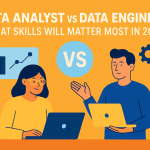
AI Marketing for Small Businesses
If you’re a small business owner or marketer, you’ve likely experimented with artificial intelligence (AI) in some form. From AI powered chatbots that automate social media posts, or help you respond more quickly to customer inquiries, AI tools have become part of everyday marketing processes. But for many, the results have been mixed – delivering value in some areas while leaving room for improvement in others. The good news is that AI technology is advancing rapidly, bringing small businesses increasingly sophisticated options that go beyond the basics. Newer tools like Dash Hudson for social media, for instance, focus on optimising visual content to engage audiences more effectively. It’s no longer just about scheduling posts; it’s about understanding what resonates with your audience and refining your strategy based on data to improve customer engagement.
This article explores how integrating the latest AI marketing tools can help small businesses work smarter. We’ll introduce a mix of tried-and-tested platforms like HubSpot and emerging players like Jasper, each designed to streamline specific areas of marketing. The right AI tool can help you maximise your budget, create impactful content, and reach the people who matter most to your business.
Table of contents
How can AI save time for small business marketing?
Can AI help me spend my budget wisely?
How can I reach the right audience?
Will AI help with planning content?
How can AI support content creation?
How can AI help optimise content?
Can AI help in measuring results?
How can AI save time for small business marketing?
AI automation can handle repetitive tasks, letting you focus on more impactful areas of your business. From social media scheduling to customer service chatbots, AI helps streamline workflows. For example, tools like Jasper and ChatGPT assist with content creation, allowing small teams to produce quality marketing materials quickly and consistently deliver a better customer experience.
Can AI help me spend my budget wisely?
With AI-powered analytics, small businesses can get smarter about where they invest their marketing dollars. Tools like Google Analytics and Funnelytics provide insights into which campaigns bring the best results or drive the highest customer satisfaction, helping you direct resources to the channels that perform. By understanding what’s working and what isn’t, you can make informed decisions that maximise your budget.
How can I reach the right audience?
AI makes it easier to target specific audiences with personalised content. Tools like HubSpot and Acquisio analyse customer data to segment your audience based on behaviours, preferences, and buying patterns. This data-driven approach allows you to create tailored advertising programmes or email marketing campaigns that speak directly to the people most likely to engage with your brand, increasing your chances of conversion. By using the right AI solution, you can also increase customer interaction, making it easier to connect with your audience.
Will AI help with planning content?
A successful marketing strategy begins with a well-researched content plan, and AI tools can make this process much simpler. By using data-driven insights, these tools help you identify trends, understand audience interests, and choose topics that will engage readers.
- AnswerThePublic: This tool uses search data to reveal common questions and topics within your industry. the AI algorithms help you generate content ideas that directly address what your audience wants to know. It’s a great place to start when planning a new marketing campaign.
- BuzzSumo: BuzzSumo uses AI to analyse trending content across the web, showing you which topics are currently resonating in your field. With this insight, you can create a content plan that taps into popular trends.
- Google Trends: Although not exclusively an AI tool, Google Trends provides a clear view of what people are searching for over time. It helps ensure your content covers timely topics that are actively being discussed.
- Moz: Moz offers keyword research and SEO analysis to identify high-impact content opportunities. With its Keyword Explorer and other features, Moz provides insights into keyword difficulty and search volume, helping you plan content marketing that aligns with search demand.
- Ahrefs: This AI powered marketing tool helps businesses create targeted content strategies by analysing market trends and audience behaviour. It’s especially useful for understanding the larger content landscape and finding gaps where your content can stand out.
How can AI support content creation?
Creating high-quality content on a consistent basis can be challenging, but AI tools simplify this task by generating ideas, drafting text, and even creating visuals.
- ChatGPT: Often regarded as the ‘Big Daddy’ of generative AI, ChatGPT is a versatile tool for creating various types of written content. Whether it’s social media posts, blog outlines, or email drafts, ChatGPT helps small businesses produce content quickly and with ease. Read our guide about how to use ChatGPT in marketing.
- Jasper: Jasper is ideal for marketers looking to produce marketing copy such as articles, product descriptions, and social media posts without sacrificing quality. Its AI capabilities assist in maintaining a consistent tone and style, helping you keep your brand voice on point.
- Canva’s Magic Write: Canva’s Magic Write tool generates AI-powered text to accompany visuals, making it perfect for creating social media posts or promotional graphics. Combined with Canva’s design templates, it enables businesses to produce visually appealing content without design expertise.
How can AI help optimise content?
Once you’ve created your content, optimisation tools help improve it for readability, search engine performance, and audience engagement.
- Grammarly: Grammarly uses AI to check for grammar, tone, and readability, ensuring your content appears professional and polished. It also provides SEO-friendly suggestions that can help improve your content’s search ranking.
- MarketMuse: MarketMuse analyses content to identify keyword gaps and content weaknesses. It suggests ways to improve your articles’ SEO, making them more comprehensive and relevant for search engines.
- Frase: Frase is designed to help you optimise content for SEO by analysing competitor pages and highlighting areas to improve. With keyword suggestions and topic recommendations, Frase ensures your content aligns with what people are searching for.
- Yoast SEO: Perfect for WordPress users, Yoast SEO offers real-time optimisation tips that improve readability, keyword usage, and other SEO factors. It’s an essential tool for making your content search friendly.
Can AI help in measuring results?
Understanding how your content is performing is key to improving your marketing efforts. AI tools can track important metrics, giving you a clear picture of what’s working and where you might need to adjust.
- Google Analytics: Google Analytics tracks website traffic, engagement, and conversions, offering a detailed view of your digital presence. Its AI-powered insights can even predict trends, helping you make informed marketing decisions.
- HubSpot: For businesses that use multiple channels, HubSpot offers an integrated view of customer interactions across email, social media, and website visits. It provides insights into customer behaviour, showing which campaigns are most effective.
- Funnelytics: Funnelytics maps out customer journeys, showing you where users drop off or convert. It provides a visual representation of your funnel, making it easy to identify successful touchpoints and areas that might need improvement.
- SEMRush: SEMRush is an all-in-one tool for tracking SEO performance, competitor analysis, and advertising data. With insights into keywords, backlinks, and more, it helps you refine your strategy to drive results.
How can AI make reporting easier?
Creating clear, insightful reports is essential for reviewing performance and guiding future campaigns. AI-driven reporting tools make it easy to compile data into visual formats, highlight key metrics, and even offer predictions based on trends.
- Google Data Studio: Google Data Studio pulls data from multiple sources, including Google Analytics, to create custom reports that are easy to read and share. It’s a great tool for tailoring data presentations to different stakeholders.
- DashThis: DashThis consolidates data from various platforms, creating unified reports with interactive visuals. It’s ideal for marketers who need to present data from multiple sources in a single report, simplifying analysis and sharing.
- Power BI: Power BI offers advanced data visualisation and reporting features, transforming raw data into actionable insights. Its AI capabilities help identify trends and predict outcomes, making it a valuable tool for data-driven decision-making.
What budget should I allocate for AI tools?
Budgeting for AI marketing tools doesn’t have to be intimidating, and many tools offer flexible pricing models to suit different business sizes and needs. From free trials to scalable subscriptions, there are options to help you find a balance between cost and value.
- Free and freemium options: Many AI tools, such as Google Analytics, offer free versions that provide essential features without the need to invest immediately. Tools like Canva and AnswerThePublic also have free plans that allow you to explore basic functionality before upgrading to a paid plan. These can be a good starting point for small businesses looking to experiment with AI without committing funds or overspending on digital marketing.
- Subscription-based tools: For tools that add more robust AI-driven capabilities, expect to budget between £10-£100 per month. Tools like Grammarly and Frase offer plans in this range, providing advanced features like SEO optimisation and detailed content suggestions. Many of these tools also offer monthly and annual pricing, allowing you to evaluate the impact before making a commitment.
- Enterprise-level AI solutions: If you’re looking to integrate more comprehensive AI functionality, such as predictive analytics or full-service customer relationship management (CRM) platforms, the costs may be higher, often starting at £100+ per month. Tools like HubSpot and SEMRush fall into this category and are ideal for small businesses with growing marketing needs. They often include a range of features from automated reporting to personalised campaign recommendations.
To find the right fit, start by identifying the areas where AI can add the most value to your business. Taking advantage of free trials will help you see real results without stretching your budget.
Is implementing AI the missing piece in your marketing strategy?
Embracing AI doesn’t mean overhauling your entire marketing strategy. The key is in how you use AI. We suggest adding tools that enhance what you’re already doing, helping you work efficiently and connect better with your audience. From planning content to measuring results, AI offers small business owners a way to stay competitive without requiring vast resources. They can also help you improve and automate customer support, enabling you to retain more clients.
Starting small, testing tools, and focusing on the areas where AI can make the biggest impact will help you see real benefits. With so many affordable and accessible options, AI is no longer just for large corporations. It’s an opportunity for every business, regardless of size, to make data-driven decisions, save time, and reach customers more effectively.
Now’s the time to find the best AI tool or suite of tools that can support your goals, get more results from your marketing effort, and give your small business the edge it needs in a crowded market.




















